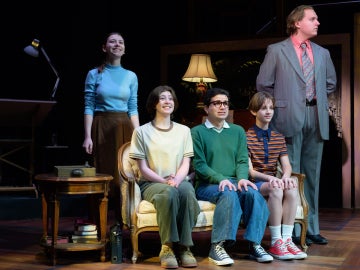Podcasting Oberlin News Develops Students’ Audio Storytelling Skills
January 17, 2020
Hillary Hempstead

Students interview Kim's Grocery & Carryout owner, Ms. Kim, for their podcast assignment.
Photo credit: Yvonne Gay
Winter Term project immerses students in podcasting as a medium; fosters storytelling, interviewing, audio recording, and editing skills.
In Podcasting Oberlin News, students are introduced to the history of the emerging podcasting industry and then are charged with creating their own podcast episode.
Led by Jan Cooper, John C. Reid Associate Professor of Rhetoric and Composition, students in this project delve into podcasting as a medium and develop the skills of storytelling, interviewing, audio recording, and editing. At the end of the project, the students’ final deliverable is a podcast episode that includes stories of interest about, and for, the Oberlin community.
For first-year Owen Anderson, his interest in various forms of storytelling made the Podcasting Oberlin News project an ideal fit for his Winter Term. “I listen to podcasts all the time when I'm traveling, and I've always wanted to create one and experiment with it as a storytelling medium.”
In addition to creating an episode of a podcast, Cooper says that she also hoped to learn more about how the town would receive the medium as a news source. “Personally, I also wanted to explore whether or not podcasting might serve well for supplying local news in a town where the sources of news have shrunk over the past couple of years.”
In preparation for making the episode, the students first became familiar with the various techniques that go into producing a podcast, such as interviewing. “We’ve employed the practices of community-based learning from the Bonner Center, along with the tools we gathered from the Winter Term History Design Lab Institute run by professors Tania Boster and Tamika Nunley, which gave the students a great introduction to interviewing and recording community members,” says Cooper.
The students then came up with four topics to research and interview townspeople about. They divided themselves into four groups of three people to carry out all the background research, interviewing, and production. To assist in the technical aspects of production, Kyle Hartzell, an instructional technologist and lecturer in cinema and art, led a workshop on how to refine editing and mixing to give their recordings better sound using open source editing software such as Audacity, along with Adobe Audition.
Through the process of making the podcast, the students took class time to workshop their projects. Cooper emphasizes the value of this in the creation of multimedia projects.
“Workshopping is a fundamental tool in our writing classes in my department, but it works equally well when trying to improve scripts, interviewing techniques, and audio mixing. We sit in a circle and listen to scripts being read or ‘tape’ being played, then every member of the group gives constructive feedback on what they heard. It’s immediately useful in making the project better.”
For Anderson, the most memorable experience was when his podcast group was first able to use the recording equipment and hear audio of themselves. “We got very excited,” he says. “The second-most memorable moment was when Professor Cooper sent us all outside on a rainy day to find people in Oberlin willing to be interviewed, right on the spot. I should add—I had more fun than I expected.”
You may also like…
“Fun Home” Finds Itself at Oberlin
A theater department Winter Term project culminates in a thoughtful musical adaptation of Alison Bechdel '81’s graphic memoir, Fun Home
Making a Difference with Business
Omukoko Okoth ’25 chose Oberlin College for its values and opportunities, and in order to take advantage of all that Oberlin has to offer, he decided to participate in the business integrative concentration.
Oberlin College & Conservatory Celebrates Black History Month
Throughout February 2024 (and a little into March), Oberlin commemorated Black History Month around the theme Ode to Home.


